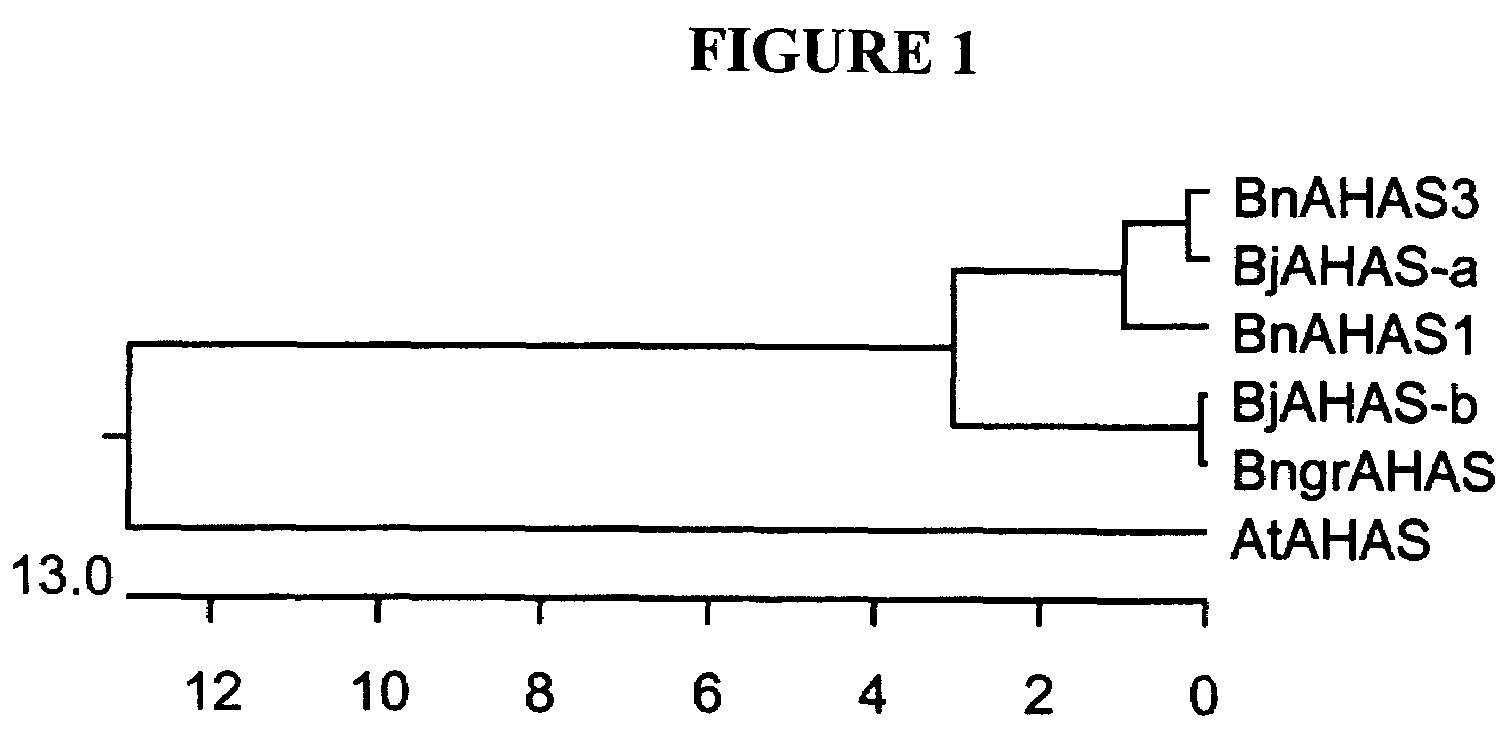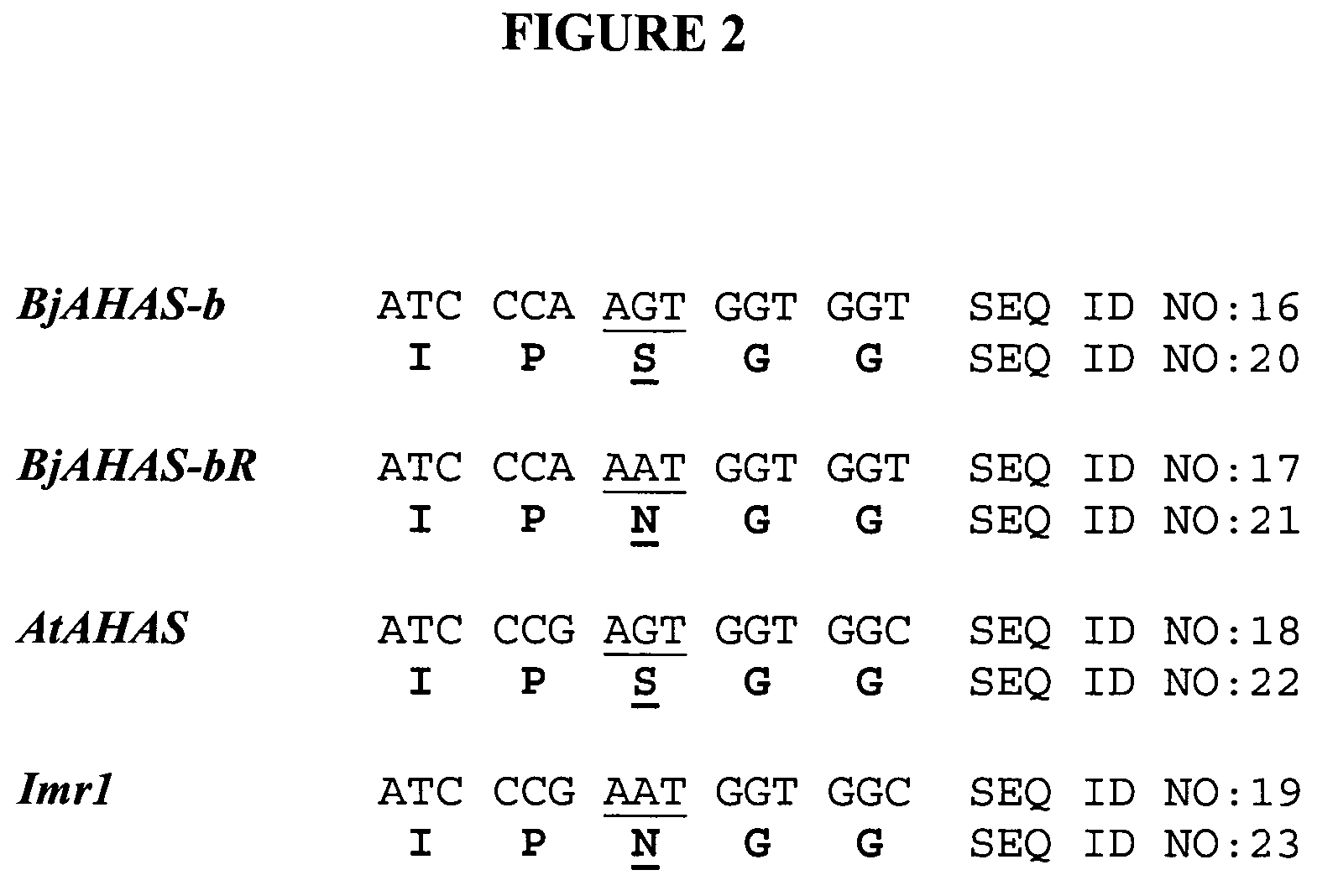Brassica AHAS genes and gene alleles that provide resistance to imidazolinone herbicides
a technology of brassica and resistance, applied in the field of brassica improvement lines, can solve the problems of difficult to get genetic transfer between chromosomes of different genomes, loss of romosomes, and poor pairing of chromosomes
- Summary
- Abstract
- Description
- Claims
- Application Information
AI Technical Summary
Problems solved by technology
Method used
Image
Examples
example 1
Creation of Mutagenized B. juncea Seed Lines
[0070]Seed of B. juncea cultivar “Arid” was treated with ethyl methyl sulfonate (EMS) at a concentration of 0.3% for 16 hours. After drying, the seed (M1) was planted and plants were grown to maturity. Seed was harvested (M2) and sown in flats containing Redi-Earth®. Flats were sprayed with a solution containing the imidazolinone herbicide Odyssey®, at a rate of 42 grams of active ingredient per hectare. Ten days after sowing, seedlings showing tolerance to the herbicide were transferred to pots. One such plant was designated as J04E-0044, which has been deposited under the ATCC Accession Number PTA-6324 at the American Type Culture Collection of 10801 University Blvd., Manassas, Va., 20110-2209, U.S.A., under terms of the Budapest Treaty.
[0071]Leaf discs were removed from seedling leaves of J04E-0044 and subjected to an assay of AHAS activity, as described by Singh et al. (Anal. Biochem. 171: 173-179, 1988). The assay measures AHAS activi...
example 2
Cloning of the AHAS Genes from B. juncea and B. nigra
[0074]Two degenerate PCR primers were designed in order to PCR amplify and clone AHAS genes from B. juncea and B. nigra. The primer design was under two considerations. First, B. juncea has A and B genomes and B. nigra has the B genome only. Therefore, the AHAS gene from the B genome might be very divergent from the known B. napus AHAS2 and AHAS3 (A genome) and the B. napus AHAS1 (C genome) (Rutledge et al., Mol. Gen. Genet. 229: 31-40, 1991). The second consideration is that the amplification should cover regions where the known mutations of the AHAS genes occur, which gave rise to resistance to various herbicides. These mutations include the Arabidopsis AHAS imr1, a Ser to Asn substitution at aa 653 (Sathasivan et al., Plant Phsyiol. 97:1044-1050, 1991) and the B. napus AHAS3 PM2, a Trp to Leu substitution at aa 557 (Hattori et al., Mol Gen Genet 246: 419-425, 1995). The forward primer KY33 (5′-GGN GCN TCN ATG GAR ATH CAY CAR-3...
example 3
Expression of the BjAHAS-a and BjAHAS-b Genes in Leaves Tissues
[0079]It is known that in B. napus the AHAS1 and AHAS3 are expressed in all somatic tissues but AHAS2 is expressed only in mature ovules and extra-embryonic tissues of immature seeds (Ouellet et al., Plant J. 2:321-330, 1992). To make sure that the BjAHAS-a and BjAHAS-b genes are expressed in somatic tissues including leaves, gene expression was determined in B. juncea leaves. For this purpose, reverse transcription-PCR (RT-PCR) was performed to measure gene expression using total RNA that was isolated from leaves with a method using TRIZOL reagent according to the manufacture's protocol (Invitrogen). One microgram of total RNA was used for cDNA synthesis, which was carried out at 42° C. for 1 hr in a total volume of 20 ul using KY34 (SEQ ID NO. 2) as the reverse primer and the SuperScript™ II as the reverse transcriptase according to the manufacture's protocol (Invitrogen). After heat denaturation at 70° C. for 10 min, ...
PUM
| Property | Measurement | Unit |
|---|---|---|
| pH | aaaaa | aaaaa |
| volume | aaaaa | aaaaa |
| volume | aaaaa | aaaaa |
Abstract
Description
Claims
Application Information
 Login to View More
Login to View More - R&D
- Intellectual Property
- Life Sciences
- Materials
- Tech Scout
- Unparalleled Data Quality
- Higher Quality Content
- 60% Fewer Hallucinations
Browse by: Latest US Patents, China's latest patents, Technical Efficacy Thesaurus, Application Domain, Technology Topic, Popular Technical Reports.
© 2025 PatSnap. All rights reserved.Legal|Privacy policy|Modern Slavery Act Transparency Statement|Sitemap|About US| Contact US: help@patsnap.com


